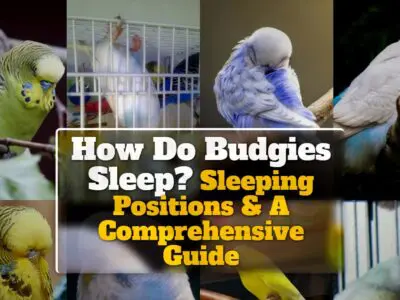Budgie owners may face when they notice their feathered budgie friends sleeping a lot.
This page insights into various factors that could cause your budgie to sleep more, including diseases, environmental issues, and the natural sleep patterns of budgies in the wild.
We will also look at the signs of sleeplessness in budgies and guide you on when to seek veterinary help.
Armed with this information, you’ll be able to better understand and support your budgie’s health and well-being.
Your budgie might be sleeping a lot due to various reasons such as illness, stress, changes in season, aging, or disruptions in their environment.
However, excessive sleep could also indicate an underlying health issue.
What Are The Diseases, Environmental Factors That Prolong Sleep Time In Budgies?
Illnesses, Diseases
Budgies might end up sleeping more than usual due to various illnesses and diseases.
These could range from avian gastric yeast infection, respiratory infections, psittacosis (also known as parrot fever), candidiasis to a weakened immune system.
Such medical conditions could leave your budgie feeling drained, leading to an increased need for sleep.
Avian Gastric Yeast Infection
A budgie suffering from avian gastric yeast infection might sleep more than normal.
The discomfort and lethargy caused by the condition can lead to increased sleep times.
Respiratory Infections
Respiratory infections could also lead to prolonged sleep in budgies.
The associated difficulty in breathing and general discomfort can make your budgie more tired, leading to extra sleep.
Psittacosis (Parrot Fever)
Psittacosis, often called parrot fever, can lead to increased fatigue in budgies, causing them to sleep more.
Candidiasis
This yeast infection can make your budgie feel unwell, leading to increased sleep times.
Avian Influenza (Bird Flu)
This viral infection can cause fatigue and weakness in budgies, leading them to sleep more.
Avian Tuberculosis
Chronic diseases like avian tuberculosis often result in generalized weakness and increased sleep.
Parasitic Infections
Budgies affected by parasites might experience discomfort and fatigue, which can lead to more sleep.
Psittacine Beak and Feather Disease (PBFD)
This viral disease affects the feathers, beak, and immune system, often causing fatigue and increased sleep in budgies.
Bacterial Infections
Various bacterial infections can cause lethargy in budgies, which may result in more sleep.
Pacheco’s Disease
A fatal viral disease that can lead to sudden death in budgies. Infected birds may show symptoms of lethargy and increased sleep.
Tumors or Cancer
Budgies with tumors or cancer often feel tired and may sleep more.
Weakened Immunity
A weakened immune system could mean your budgie is fighting off an illness, leading to increased fatigue and sleep.
Diseases And Their Impact On Budgie Sleep Patterns Table
| Disease | How It Affects Budgie’s Sleep |
|---|---|
| Avian Gastric Yeast Infection | Causes discomfort and lethargy, leading to increased sleep times. |
| Respiratory Infections | Causes breathing difficulty and discomfort, resulting in more sleep. |
| Psittacosis (Parrot Fever) | Causes fatigue, prompting more sleep. |
| Candidiasis | Can make budgies feel unwell, leading to increased sleep times. |
| Weakened Immunity | Can cause budgies to feel tired and sleep more than usual. |
| Tumors or Cancer | Often leads to fatigue, resulting in more sleep. |
| Avian Influenza (Bird Flu) | This viral infection can cause fatigue, leading to more sleep. |
| Avian Tuberculosis | Often results in generalized weakness and increased sleep. |
| Parasitic Infections | Can cause discomfort and fatigue, leading to more sleep. |
| Psittacine Beak and Feather Disease (PBFD) | Affects the feathers, beak, and immune system, often causing fatigue and increased sleep. |
| Bacterial Infections | Can cause lethargy, resulting in more sleep. |
| Chlamydiosis (Parrot Fever) | Can lead to increased fatigue, causing more sleep. |
| Pacheco’s Disease | May lead to symptoms of lethargy and increased sleep. |
Molting Season
During the molting season, budgies often sleep more as their bodies work to grow new feathers.
This is a normal, seasonal occurrence and nothing to worry about.
Breeding Season
The breeding season could also impact your budgie’s sleep schedule.
The increased activity and energy expenditure can lead to the need for more sleep.
Stress, Depression
Emotional factors such as stress or depression can affect your budgie’s sleep.
They might sleep more because their overall energy is low.
Incorrect Lighting That Interferes With Sleep
Budgies require a certain amount of darkness to sleep well.
If their environment is too bright, they might have difficulty sleeping, which could lead to oversleeping when they do get a chance to rest.
Sounds That Interfere With Sleep
Excessive noise in the budgie’s environment can disrupt their sleep.
As a result, they might sleep more during quieter times.
Age (Do Older Budgies Sleep More?)
Just like in humans, older budgies may require more sleep.
As they age, their energy levels might decrease, leading to increased sleep.
Cage Space Problems: Limited Space, Crowded Cage
Limited space or a crowded cage can lead to stress and discomfort for your budgie, potentially leading to more sleep as a coping mechanism.
Fatigue, Lethargy
If your budgie is constantly active and doesn’t get enough time to rest, they may end up sleeping more to recover from fatigue or lethargy.
Avoiding The Heat Of The Sun (Sleeping Patterns In Relation To Their Natural Habitat)
In their native Australian environments, budgies, have adapted their sleeping patterns to cope with the region’s harsh climatic conditions.
During the day, especially when the sun is at its peak and temperatures are soaring, budgies often retreat to a cooler, shaded place to rest and avoid the scorching heat.
This resting phase is not necessarily deep sleep, but more of a tranquil, relaxed state to pass the time and conserve energy.
As the weather cools down towards the evening, they become more active.
Therefore, seeing your domestic budgie taking naps during the day could simply be an inherited natural behavior, mimicking their wild counterparts.
It’s crucial, though, to distinguish this normal resting behavior from excessive sleeping, which could signal underlying health issues.
How Does A Sleepless Budgie Behave? How To Know Your Budgie Is Sleepless?
A sleepless budgie might show signs such as lethargy, aggression, trying to sleep during the day, or looking lethargic all day.
These could be indicative of a lack of sleep or an underlying health issue.
How Long Do Budgies Sleep In Their Natural Habitat?
In their natural habitats, budgies usually sleep around 10-12 hours a day, mostly at night. However, this can vary based on factors like season, availability of food, and perceived threats in the environment.
Why Do Budgies Sleep During The Day? (Fluffing Up And Constant Sleeping)
Budgies might sleep during the day due to various reasons.
For example, if they feel secure and comfortable in their environment, they might take short naps throughout the day.
However, constant sleeping or fluffing up might be signs of distress or illness.
Why Is My Female Budgie Sleeping So Much?
Your female budgie might be sleeping a lot due to factors such as illness, stress, age, or breeding season.
If the sleeping habits persist and are combined with other signs of distress or illness.
Should I Take My Budgie To The Vet If It’s Sleeping Too Much?
If your budgie is sleeping more than usual and is showing other signs of illness or distress, such as changes in appetite or behaviour, it’s recommended to take them to the vet.
It’s always better to be safe than sorry when it comes to your feathered friend’s health.



